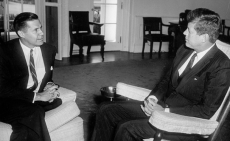The CPD Blog is intended to stimulate dialog among scholars and practitioners from around the world in the public diplomacy sphere. The opinions represented here are the authors' own and do not necessarily reflect CPD's views. For blogger guidelines, click here.
Join the USC Center on Public Diplomacy as we cordially announce the awards-recipients of the Reinventing Public Diplomacy through Games Contest!
When: May 8th, 2006 3:00-5:00 p.m. PST
Where: Davidson Executive Conference Center
University of Southern California
3415 S. Figueroa Street
Los Angeles, CA 90089-0871
There will also be simulcast of the Awards Ceremony within Second Life! Stay tuned for more details!

50 years after Gullion, Nicholas J. Cull looks at the origin of the term "public diplomacy."
The latest monthly television ratings in Saudi Arabia by the independent pollster IPSOS-STAT show al-Arabiya dramatically widening its lead over al-Jazeera as the number one satellite television news outlet for the Middle East.
The critical success factor for any government's public diplomacy function is whether its connection to policy making is one-way or two-way.
Delivered with equal measure of art and science, diplomacy is a
non-violent approach to the management of international relations and
global issues which seeks to resolve conflict through discussion,
negotiation and partnership. The diplomats' brief is unambiguous: to
advance or defend their country's political and economic place in the
world by the most effective means. That is the purpose, the essence of
diplomacy.
"[T]hrough the press section of USIS that the Communist parties themselves represented at the Moscow Congress have come to know one of the most serious and dramatic documents in the Communist literature of the world."
--Pietro Nenni, Secretary General, Italian Socialist Party, 1957
This week workers at the Brooklyn Bridge chanced upon a forgotten room
containing supplies stockpiled against a nuclear attack. Dates on the
materials were evocative: 1957 - the year of Sputnik; 1962 - the year
of the Cuban missile crisis. This discovery is an oddly evocative
interruption from the high point last long war into what future
historians will doubtless see as the opening phase of the era-defining
conflict. It is like a ghost in a Shakespeare play -- reminding us of
In the classic 1957 film "The Incredible Shrinking Man," the character played by actor Grant Williams is enveloped by curious fog while anchored on his small boat. Within days, his clothes begin to loosen and he gets smaller by the hour. "I was continuing to shrink, to become…what? Would others follow me?" he wondered.
Yes, others would follow. The Voice of America would follow.
Pages
Visit CPD's Online Library
Explore CPD's vast online database featuring the latest books, articles, speeches and information on international organizations dedicated to public diplomacy.
POPULAR ARTICLES
-
January 29
-
January 20
-
January 28
-
January 2
-
January 8
Featured Blogger
Join the Conversation
Interested in contributing to the CPD Blog? We welcome your posts. Read our guidelines and find out how you can submit blogs and photo essays >.








